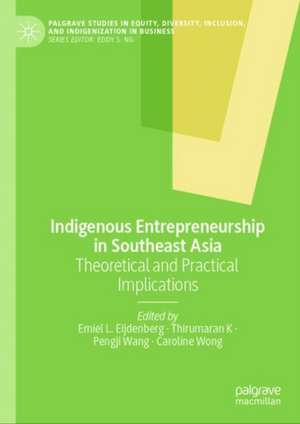Indigenous Entrepreneurship in Southeast Asia: Theoretical and Practical Implications: Palgrave Studies in Equity, Diversity, Inclusion, and Indigenization in Business
Editat de Emiel L. Eijdenberg, Thirumaran K, Pengji Wang, Caroline Wongen Limba Engleză Hardback – 10 apr 2024
This book provides an in-depth exploration of indigenous entrepreneurship and its challenges while addressing ways to make businesses more inclusive and sustainable in the long term. Offering a balanced mix of critical perspectives, theoretical insights and practical implications, provided by both academics and practitioners, it examines how indigenous entrepreneurship practices in Southeast Asia challenge existing theories in business and management research. The chapters also explore the role of various stakeholders, such as the larger community and society, supply chain members, policy-makers, etc., in facilitating indigenous entrepreneurship.
Highlighting the uniqueness and diversity of indigenous entrepreneurship in Southeast Asia, this book renders a comprehensive overview of contemporary indigenization topics, organized by Southeast Asian cultural and national contexts.
Preț: 894.16 lei
Preț vechi: 1090.44 lei
-18% Nou
Puncte Express: 1341
Preț estimativ în valută:
171.15€ • 185.97$ • 143.86£
171.15€ • 185.97$ • 143.86£
Carte tipărită la comandă
Livrare economică 21 aprilie-05 mai
Preluare comenzi: 021 569.72.76
Specificații
ISBN-13: 9783031544569
ISBN-10: 3031544560
Ilustrații: XXI, 301 p. 44 illus., 34 illus. in color.
Dimensiuni: 148 x 210 mm
Greutate: 0.54 kg
Ediția:2024
Editura: Springer International Publishing
Colecția Palgrave Macmillan
Seria Palgrave Studies in Equity, Diversity, Inclusion, and Indigenization in Business
Locul publicării:Cham, Switzerland
ISBN-10: 3031544560
Ilustrații: XXI, 301 p. 44 illus., 34 illus. in color.
Dimensiuni: 148 x 210 mm
Greutate: 0.54 kg
Ediția:2024
Editura: Springer International Publishing
Colecția Palgrave Macmillan
Seria Palgrave Studies in Equity, Diversity, Inclusion, and Indigenization in Business
Locul publicării:Cham, Switzerland
Cuprins
Chapter 1: A brief introduction to indigenous entrepreneurship in Southeast Asia.- Chapter 2: A systematic review of literature (2006 – 2022) on indigenous entrepreneurship in Southeast Asia and the world.- Chapter 3: Poverty and indigenous entrepreneurship: A case study of the Mah Meri people in Malaysia.- Chapter 4: Malay-Bumiputera halal herbs industry in the post-pandemic context: Developing SME performance through economic stimulus packages, supply chain management and internationalisation.- Chapter 5: Between assimilation and cultural pluralism for indigenous livelihood and entrepreneurship: Case of Lumad in the Philippines.- Chapter 6: Beyond entrepreneurship: The Iu Mien’s silver craft activism in Thailand.- Chapter 7: Local knowledge, indigenous entrepreneurship, and tourism business resilience: An Indonesian micro-case study.- Chapter 8: Indigenous entrepreneurship in Thailand: The case of Gaia Ashram and Lazyman Coffee.- Chapter 9: Indigenous entrepreneurship in Myanmar:The role of community-based enterprises in sustainable human development.- Chapter 10: Gender and credit access for indigenous rural self-employed businesses: A case study in Vietnam and Thailand.- Chapter 11: How does business owner’s employee-centric leadership affect SME employees’ work engagement: The mediating role of “Diuwongke”.- Chapter 12: The rise of digital technology and indigenous entrepreneurship in Southeast Asia.- Chapter 13: Reflections on contributions, inspiration for the future: Ideas for research and practice of indigenous entrepreneurship in Southeast Asia and beyond
Notă biografică
Emiel L. Eijdenberg is an Associate Professor and the Singapore Director of the Centre for International Trade and Business in Asia (CITBA) at James Cook University, Singapore.
Thirumaran K is an Associate Professor and the Academic Head of JCU Singapore Business School at James Cook University, Singapore.
Pengji Wang is Associate Professor at James Cook University, Singapore.
Caroline Wong is the Associate Dean of Learning and Teaching and an Associate Professor at James Cook University, Singapore.
Thirumaran K is an Associate Professor and the Academic Head of JCU Singapore Business School at James Cook University, Singapore.
Pengji Wang is Associate Professor at James Cook University, Singapore.
Caroline Wong is the Associate Dean of Learning and Teaching and an Associate Professor at James Cook University, Singapore.
Textul de pe ultima copertă
This book provides an in-depth exploration of indigenous entrepreneurship and its challenges while addressing ways to make businesses more inclusive and sustainable in the long term. Offering a balanced mix of critical perspectives, theoretical insights and practical implications, provided by both academics and practitioners, it examines how indigenous entrepreneurship practices in Southeast Asia challenge existing theories in business and management research. The chapters also explore the role of various stakeholders, such as the larger community and society, supply chain members, policy-makers, etc., in facilitating indigenous entrepreneurship.
Highlighting the uniqueness and diversity of indigenous entrepreneurship in Southeast Asia, this book renders a comprehensive overview of contemporary indigenization topics, organized by Southeast Asian cultural and national contexts.
Thirumaran K is an Associate Professor and the Academic Head of JCU Singapore Business School at James Cook University, Singapore.
Pengji Wang is Associate Professor at James Cook University, Singapore.
Caroline Wong is the Associate Dean of Learning and Teaching and an Associate Professor at James Cook University, Singapore.
Caracteristici
Presents rich insights, from quantitative and qualitative studies to research notes and practitioner’s perspectives Offers theory-based and practice-oriented contributions by experts of Southeast Asian and entrepreneurship studies Provides a spectrum of regional case studies and in-situ approaches to the development of indigenous entrepreneurship








